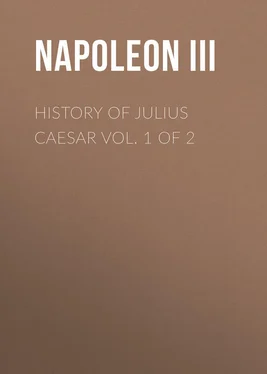Napoleon III - History of Julius Caesar Vol. 1 of 2
Здесь есть возможность читать онлайн «Napoleon III - History of Julius Caesar Vol. 1 of 2» — ознакомительный отрывок электронной книги совершенно бесплатно, а после прочтения отрывка купить полную версию. В некоторых случаях можно слушать аудио, скачать через торрент в формате fb2 и присутствует краткое содержание. Жанр: foreign_antique, foreign_prose, Биографии и Мемуары, на английском языке. Описание произведения, (предисловие) а так же отзывы посетителей доступны на портале библиотеки ЛибКат.
- Название:History of Julius Caesar Vol. 1 of 2
- Автор:
- Жанр:
- Год:неизвестен
- ISBN:нет данных
- Рейтинг книги:5 / 5. Голосов: 1
-
Избранное:Добавить в избранное
- Отзывы:
-
Ваша оценка:
- 100
- 1
- 2
- 3
- 4
- 5
History of Julius Caesar Vol. 1 of 2: краткое содержание, описание и аннотация
Предлагаем к чтению аннотацию, описание, краткое содержание или предисловие (зависит от того, что написал сам автор книги «History of Julius Caesar Vol. 1 of 2»). Если вы не нашли необходимую информацию о книге — напишите в комментариях, мы постараемся отыскать её.
History of Julius Caesar Vol. 1 of 2 — читать онлайн ознакомительный отрывок
Ниже представлен текст книги, разбитый по страницам. Система сохранения места последней прочитанной страницы, позволяет с удобством читать онлайн бесплатно книгу «History of Julius Caesar Vol. 1 of 2», без необходимости каждый раз заново искать на чём Вы остановились. Поставьте закладку, и сможете в любой момент перейти на страницу, на которой закончили чтение.
Интервал:
Закладка:
And it must be acknowledged, as they supported the greatest share of the burthen of war and taxation, they had a better claim than the others to the conquered lands; they thought, moreover, that the colonies were sufficient to support an agricultural population, and they acted rather as State farmers than as proprietors of the soil. According to the public law, indeed, the ager publicus was inalienable, and we read in an ancient author: – “Lawyers deny that the soil which has once begun to belong to the Roman people, can ever, by usage or possession, become the property of anybody else in the world.” 131 131 Agannius Urbicus, De Controversiiss agrorum , in the Gromatici veteres , ed. Lachmann, vol. I, p. 82.
In spite of this principle, it would have been wisdom to give, to the poor citizens who had fought, a part of the spoils of the vanquished; for the demands were incessant, and after 268, renewed almost yearly by the tribunes or by the consuls themselves. In 275, a patrician, Fabius Cæso, taking the initiative in a partition of lands recently conquered, exclaimed: “Is it not just that the territories taken from the enemy should become the property of those who have paid for it with their sweat and with their blood?” 132 132 Titus Livius, II. 48.
The Senate was as inflexible for this proposition as for those which were brought forward by Q. Considius and T. Genucius in 278, by Cn. Genucius in 280, and by the tribunes of the people, with the support of the consuls Valerius and Æmilius, in 284. 133 133 “Lucius Æmilius said that it was just that the common goods should be shared among all the citizens, rather than leave the enjoyment of them to a small number of individuals; that in regard to those who had seized upon the public lands, they ought to be sufficiently satisfied that they had been left to enjoy them during so long a time without being disturbed in their possession, and that if afterwards they were deprived of them, it ill became them to be obstinate in retaining them. He added that, besides the public law acknowledged by general opinion, and according to which the public goods are common to all the citizens, just as the goods of individuals belong to those who have acquired them legitimately, the Senate was obliged, by a special reason, to distribute the lands to the people, since it had passed an ordinance for that purpose already seventeen years ago.” (Dionysius of Halicarnassus, IX. 51.)
Yet, after fifty years of struggles since the expulsion of the Tarquins, the tribune Icilius, in 298, obtained the partition of the lands of Mount Aventine, by indemnifying those who had usurped a certain portion of them. 134 134 Titus Livius, III. 31. – Dionysius of Halicarnassus, X. 33 et seq.
The application of the law Icilia to other parts of the ager publicus 135 135 “The plebeians complain loudly that their conquests have been taken from them; that it is disgraceful that, having conquered so many lands from the enemy, not the least portion of it remains to them; that the ager publicus is possessed by rich and influential men who take the revenue unjustly, without other title than their power and unexampled acts of violence. They demand finally that, sharing with the patricians all the dangers, they may also have their share in the advantages and profit derived from them.” (Year of Rome 298.) (Dionysius of Halicarnassus, X. 36.)
was vainly solicited in 298 and the following years; but in 330, a new tax was imposed upon the possessors of the lands for the pay of the troops. The perseverance of the tribunes was unwearied, and, during the thirty-six years following, six different propositions were unsuccessful, even that relating to the territory of the Bolani, newly taken from the enemy. 136 136 “The moment would have been well chosen, after having taken vengeance on the seditious, to propose, in order to soothe people’s minds, the partition of the territory of the Bolani; they would thus have weakened the desire for an agrarian law which would expel the patricians from the public estates they had unjustly usurped. For it was an indignity which cut the people to the heart, this rage of the nobility to retain the public lands they occupied by force, and, above all, their refusal to distribute to the people even the vacant lands recently taken from the enemy, which, indeed, would soon become, like the rest, the prey of some of the nobles,” (Year of Rome 341.) (Titus Livius, IV. 51.)
In 361 only, a senatus consultus granted to each father of a family and to each free man seven acres of the territory which had just been conquered from the Veii. 137 137 Titus Livius, V. 30.
In 371, after a resistance of five years, the Senate, in order to secure the concurrence of the people in the war against the Volsci, agreed to the partition of the territory of the Pomptinum (the Pontine Marshes), taken from that people by Camillus, and already given up to the encroachments of the aristocracy. 138 138 Titus Livius, VI. 21. – It appears that the Pontine Marshes were then very fertile, since Pliny relates, after Licinius Mucianus, that they included upwards of twenty-four flourishing towns. ( Natural History , III. v. 56, edit. Sillig.)
But these partial concessions were not enough to satisfy the plebeians or to repair past injustices; in the Licinian law the claims of the people, which had been resisted during a hundred and thirty-six years, triumphed; 139 139 Titus Livius, VI. 35-42. – Appian, Civil Wars , I. 8.
it did not entirely deprive the nobles of the enjoyment of the lands unjustly usurped, but it limited the possession of them to five hundred jugera . When this repartition was made, the land which remained was to be distributed among the poor. The proprietors were obliged to maintain on their lands a certain number of free men, in order to augment the class from which the legions were recruited; lastly, the number of cattle on each domain was fixed, in order to restrain the culture of the meadows, in general the most lucrative, and augment that of the arable lands, which relieved Italy from the necessity of having recourse to foreign corn.
This law of Licinius Stolo secured happy results; it restrained the encroachments of the rich and great, but only proceeded with moderation in its retrospective effects; it put a stop to the alarming extension of the private domains at the expense of the public domain, to the absorption of the good of the many by the few, to the depopulation of Italy, and consequently to the diminution of the strength of the armies. 140 140 See the remarkable work of M. A. Mace, Sur les Lois Agraires , Paris, 1846.
The numerous condemnations for trespasses against the law Licinia prove that it was carried into execution, and for the space of two hundred years it contributed, with the establishment of new colonies, 141 141 Roman Colonies. – Second period: 244-416 Lavici (Labicum) (336). Latium. ( Via Lavicana .) La Colonna. Vitellia (359). The Volscians. ( Via Prænestina .) Uncertain. Civitella or Valmontone . Satricum (370). The Volscians. Banks of the Astura. Casale di Conca , between Anzo and Velletri . Latin Colonies. – Second period: 244-416. Antium (287). Volscians. Torre d’Anzio or Porto d’Anzio . Suessa Pometia (287). Near the Pontine Marshes. Disappeared at an early period. Cora . Volscians (287). Cori . Signia (259). Volscians. Segni . Velitræ (260). Volscians. Velletri . Norba (262). Volscians. Near the modern village of Norma . Ardea (312). Rutuli. Ardea . Circeii (361). Aurunces. Monte Circello : San Felice or Porto di Paolo . Satricum (369). Volscians. Casale di Conca . Sutrium (371). Etruria. ( Via Cassia .) Sutri . Setia (372) Volscians. Sezze . Nepete (381). Etruria. Nepi .
to maintain this class of agriculturists – the principal sinews of the State. We see indeed that, from this moment, the Senate itself took the initiative of new distributions of land to the people. 142 142 It is thus that we see, in 416, each poor citizen receiving two jugera , taken from the land of the Latins and their allies. In 479, after the departure of Pyrrhus, the Senate caused lands to be distributed to those who had fought against the King of Epirus. In 531, the Flaminian law, which Polybius accuses wrongly of having introduced corruption into Rome, distributed by head the Roman territory situated between Rimini and the Picenum; in 554, after the capture of Carthage, the Senate made a distribution of land to the soldiers of Scipio. For each year of service in Spain or Africa, each soldier received two jugera , and the distribution was made by decemvirs. (Titus Livius, XXXI. 49.)
Интервал:
Закладка:
Похожие книги на «History of Julius Caesar Vol. 1 of 2»
Представляем Вашему вниманию похожие книги на «History of Julius Caesar Vol. 1 of 2» списком для выбора. Мы отобрали схожую по названию и смыслу литературу в надежде предоставить читателям больше вариантов отыскать новые, интересные, ещё непрочитанные произведения.
Обсуждение, отзывы о книге «History of Julius Caesar Vol. 1 of 2» и просто собственные мнения читателей. Оставьте ваши комментарии, напишите, что Вы думаете о произведении, его смысле или главных героях. Укажите что конкретно понравилось, а что нет, и почему Вы так считаете.












